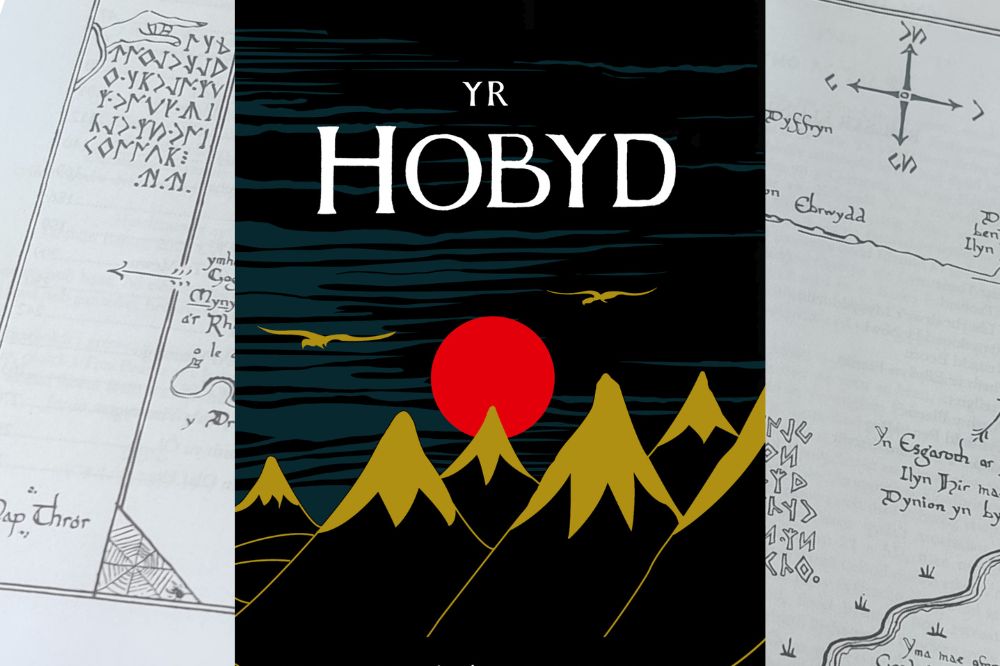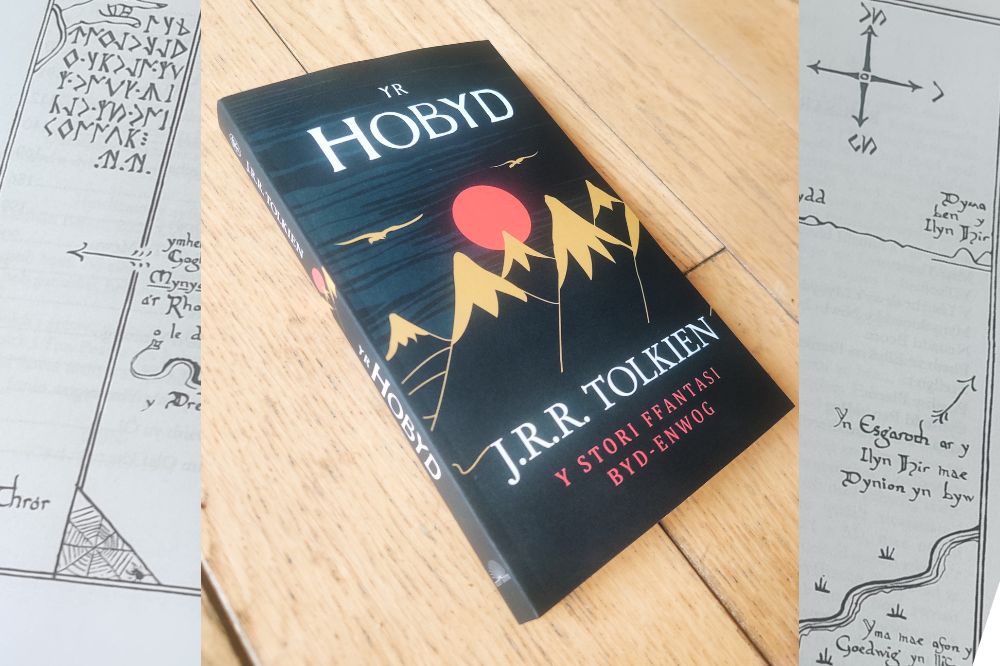Publisher overwhelmed by response to Welsh Hobbit

A Welsh publisher bringing out a Welsh version of J.R.R. Tolkien’s classic fantasy novel The Hobbit has been ‘overwhelmed’ by the response to the book so far.
Melin Bapur Books, which launched earlier this year in order to take on similar projects as well as re-publishing classic Welsh-language literature of the past, has obtained a licence from the Tolkien Estate to publish the translation, which will be the first into Welsh of any of Tolkien’s works.
“Remarkable”
Editor of Melin Bapur Adam Pearce, who also translated the book, explains: “We knew this would probably be a popular book, but the response has been absolutely overwhelming so far.
“We’ve sold almost six hundred copies in just about a month, which is remarkable for a book only available to pre-order on our website, in a language with only about six hundred thousand speakers – it’s yet to hit the shelves of a single bookshop for example, we haven’t spent a penny on advertising, and it’s not yet available on Amazon.
“It will be interesting to see how it fares over the rest of the year but it wouldn’t be any kind of surprise at this stage if this turns out to be the best-selling book in Welsh of 2024.”

One part of the book’s success has been the interest from Tolkien collectors all over the world, including many that don’t speak Welsh.
“We’ve sold copies in the US, Australia, Netherlands, Germany, Slovenia, Luxembourg, Finland, Spain, Estonia, even China – a lot of these will be to Welsh expatriates of course, but the response from the Tolkien fan community has been really brilliant too.”
Welsh was one of the inspirations behind some of Tolkien’s fictional languages, and though very little of those languages actually appears in The Hobbit, there have been whole books written on the Welsh links to Tolkien’s works; making an actual translation of Tolkien’s fiction into Welsh something that many have felt was long overdue.
Pearce elaborates: “It’s been great to see the book discussed by fan communities on reddit, Facebook and elsewhere; a lot of them have been saying how overdue a Welsh version of the Hobbit is and we’re very pleased to be able to meet this demand at last!
“We’ve included some nice little features that will hopefully appeal to the collectors.”
Coelbren y Beirdd
One such feature is the use of a uniquely Welsh written script: the original English version of The Hobbit uses Anglo-Saxon runes to represent the written language of the Dwarves.
In Yr Hobyd these have been replaced by the 18th-century Welsh Coelbren y Beirdd, widely believed to have been invented by Iolo Morgannwg, originator of many of the traditions around the Eisteddfod.
Adam Pearce explains the rationale: “Using Anglo-Saxon—that is English—runes for Welsh never seemed right; fortunately we have Coelbren which was once fashionable for things like engraving on gravestones in Welsh.
“The letters are extremely rune-like so in keeping with the original, but in a way that helps give the translation a uniquely ‘Welsh’ feel.
“As it’s basically a fantasy alphabet, it’s very appropriate for a fantasy story! This feature has really stoked the curiosity of some of the fans.”

Unsurprisingly, three quarters of the of the sales though have been within Wales itself.
“Lots of people have got in touch to thank me and say how overdue this is. It’s been very humbling, and I only hope the book meets their expectations!
“Our aim all along with Melin Bapur has been to encourage people to read in Welsh by publishing some of the kind of books other publishers don’t seem to be interested in.
“I believe there is a group of people out there who like the idea of reading in Welsh but don’t know where to start, or worry their Welsh won’t be good enough.
“Reading a story that you already know can be a great way to overcome that and get used to the written language.
“If, by making this translation, I’ve encouraged anyone to have a go at reading in Cymraeg that wouldn’t otherwise do, then that can only be a good thing!”
Accessibility
The use – or not – of Welsh dialects in the translation is something many have asked about, but Pearce plays down this element. “I was conscious of avoiding been seen to be using any particular dialect of Welsh for the narrative and most of the dialogue in the translation.
“Unlike later works by Tolkien, most characters in The Hobbit speak a kind of RP “King’s English”, for which Standard, informal but non-dialectical Welsh is a perfect substitute.
“I was also conscious of making the text as accessible as possible to all readers whether they’re from the north, south, Montgomeryshire or learners – contrary to what some people seem to believe, there is such a thing as standard Welsh.”
The one exception is the scene with the Trolls, who in Tolkien’s original speak in Cockney accents, substituted in the translation for Caernarfon Welsh (“Cofi”).
“There was no way I could have the Trolls speaking standard Welsh, so; they speak in Cofi. I hope this is taken as the gesture of affection it was intended to be, and not as any kind of insult!”
Yr Hobyd is on sale from www.melinbapur.cymru and priced at £14.99+P&P; it will also shortly be available in a range of bookshops across Wales including Cant a Mil and Caban (both Cardiff), Awen Meirion (Bala), Tŷ Tawe (Swansea), Siop Lyfrau’r Hen Bost (Blaenau Ffestiniog), Courtyard Books (Llangollen) and others.
Support our Nation today
For the price of a cup of coffee a month you can help us create an independent, not-for-profit, national news service for the people of Wales, by the people of Wales.






Apparently we are awaiting our copy, news to me…people collect translations so I’m not surprised and I won’t be surprised if it is a runaway success for Christmas…Asterix is great in translation too…
Wel dyma newyddion da iawn. Gwych gweld gorchestweithiau fel hyn yn cael eu cyfieithu i’r Gymraeg. Gobeithio y caf ei ddarllen wedi gorffen efo’r gwair. Paned, mygyn, llyfyr da, a’m traed ar y ffendar. Hen bryd imi ymddeol…
He plagiarised virtually the entirety of the Mabinogi. Adding in Fantasy elements to hide the fact. Whether he had a soft spot for Wales and the British language doesn’t change this fact.
Tolkien drew from many sources and is what many, probably all, authors do. It’s a stretch to accuse Tolkien of plagiarizing the entirety of anything. The Lord of the Rings/The Hobbit was genius the way he told a story, created language and a whole culture and history around dwarves, hobbits, elves, wizards…good vs evil.. during a time the nazis were taking Europe by storm.